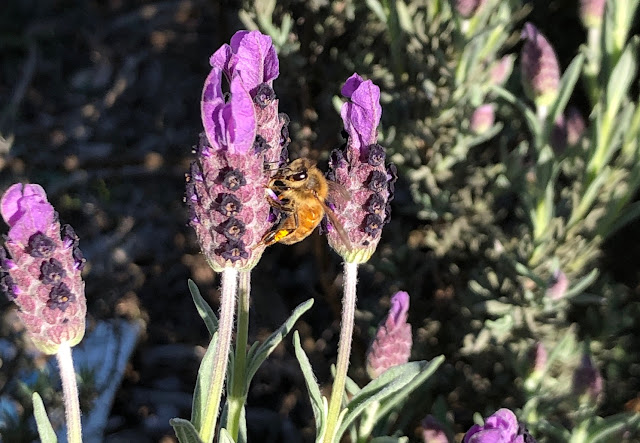
Resources to view during those too-hot-to-garden times

|
|
Pollinators are the subject of an upcoming webinar from the Placer County master gardeners. (Photo:
Kathy Morrison)
|
Around here, mornings in spring are made for gardening. But if — when! — the weather heats up, ome inside and spend some time online with the many resources available from the University of California Agriculture and Natural Resources, including the UC Cooperative Extension.
Check out these online events and webinars:
-- Principles of Propagation Zoom Workshop, 10:30-11:30 a.m. Saturday, May 8, presented by the Placer County master gardeners. As they note: "Propagation is the term for the multiplication of plants, either by natural means or by the actions of the nurseryman or gardener. This introductory workshop will show you some of the many ways you can propagate plants." Click here for the Zoom link and password .
-- Heat Illness Prevention and Environmental Hazards in Your Garden, 9 a.m. to 10:30 a.m. Wednesday, May 12. This timely virtual presentation is from the El Dorado County master gardeners. "Prevention is key to avoiding heat related illnesses and potential injuries and illnesses associated with environmental hazards, such as rattlesnakes, poisonous plants, skin cancer, insect bites, etc. Join Master Gardener Cathie Mankins to learn tips on preventing illnesses and injuries in your garden." Registration is free but required .
-- Springtime Household Pests, 1 p.m. Thursday, May 20. This 1-hour webinar is part of a new monthly series from the UC Statewide Integrated Pest Management Program. "This webinar will cover identification and management of pests encountered in the home during springtime including carpet beetles, fleas, and fungus gnats associated with houseplants." The present is Dr. Andrew Sutherland, Area Urban IPM Advisor, San Francisco Bay Area. Free, but registration required here . The June 17 webinar will be "IM for Rodents." For more on the IPM series, visit this page .
-- Plant It and They Will Come: Planning for Pollinators Zoom Workshop, 10:30-11:30 a.m. Saturday, May 22, also by the Placer County master gardeners. "Learn how to attract and support bees, butterflies and other pollinators by choosing a palette of plants that provide a living landscape which offers nourishment and nesting places for these creatures that enliven our gardens, as well as provide pollination services. It’s a win-win for humans and pollinators!" Go here for the Zoom link and password .
Several view-anytime videos are linked from the Sacramento County master gardeners video library . Here are a few that are relevant right now:
"Better Pollination In The Home Vegetable Garden," from the Honey Bee Haven at UC Davis.
"Thinning Fruit on Your Fruit Trees," by the Sacramento County master gardeners.
"Aphid-eating Insects in Action!" The focus is on beneficial insects that devour (and I mean devour, wow!) bad bugs, from UC IPM.
Comments
0 comments have been posted.Sacramento Digs Gardening to your inbox.
Sites We Like
Garden Checklist for week of April 21
This week there’s plenty to keep gardeners busy. With no rain in the immediate forecast, remember to irrigate any new transplants.
* Weed, weed, weed! Get them before they flower and go to seed.
* April is the last chance to plant citrus trees such as dwarf orange, lemon and kumquat. These trees also look good in landscaping and provide fresh fruit in winter.
* Smell orange blossoms? Feed citrus trees with a low dose of balanced fertilizer (such as 10-10-10) during bloom to help set fruit. Keep an eye out for ants.
* Apply slow-release fertilizer to the lawn.
* Thoroughly clean debris from the bottom of outdoor ponds or fountains.
* Spring brings a flush of rapid growth, and that means your garden is really hungry. Feed shrubs and trees with a slow-release fertilizer. Or mulch with a 1-inch layer of compost.
* Azaleas and camellias looking a little yellow? If leaves are turning yellow between the veins, give them a boost with chelated iron.
* Trim dead flowers but not leaves from spring-flowering bulbs such as daffodils and tulips. Those leaves gather energy to create next year's flowers. Also, give the bulbs a fertilizer boost after bloom.
* Pinch chrysanthemums back to 12 inches for fall flowers. Cut old stems to the ground.
* Mulch around plants to conserve moisture and control weeds.
* From seed, plant beans, beets, cantaloupes, carrots, corn, cucumbers, melons, radishes and squash.
* Plant onion sets.
* In the flower garden, plant seeds for asters, cosmos, celosia, marigolds, salvia, sunflowers and zinnias.
* Transplant petunias, zinnias, geraniums and other summer bloomers.
* Plant perennials and dahlia tubers for summer bloom.
* Mid to late April is about the last chance to plant summer bulbs, such as gladiolus and tuberous begonias.
* Transplant lettuce seedlings. Choose varieties that mature quickly such as loose leaf.